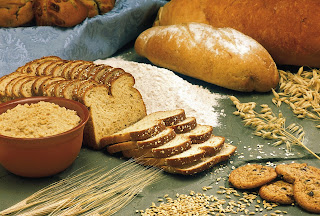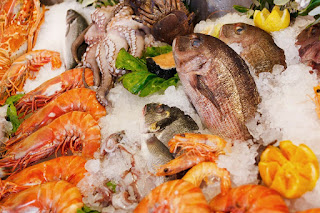Here we are in a world where we have different kinds of foods, like rice, vegetables, beans, fruits, yam, ... If I'm to list everything, it will take me 10 years to write them.
Even though we mention all the types of food in this world, we definitely can't eat them all.
And since we can't eat all of them, we have to select the healthy foods and discard the unhealthy foods in order to have maintain a healthy diet.
What is a Healthy Diet?
According to Wikipedia, a healthy diet is a diet (that is, what you eat) that contains the right amounts of all the food groups. It includes fruit, vegetables, grains, dairy products, and protein. It improves and maintains your overall health.
This implies that every plate of food you eat must contain the right amount of these 6 classes of food - Carbohydrates, Protein, Fat and oil, Vitamins, Mineral salt and Water.
Any meal that does not contain all the classes of food or the right amount of the required nutrients is said to be an unhealthy diet which is the major cause of malnutrition and obesity in our world today.
Hence, let's explore the 7 nourishing foods that make up a healthy diet as well as their benefits.
1. Fruits
Fruits are a major part of a healthy diet. Most fruits are high in fiber and vitamins, especially vitamin C from citrus fruits like oranges, pineapples and lime.
Using fruits, you can make enjoyable and naturally sweet fruit dishes like Mango pudding, Chutney, Sicilian orange salad, Fruit salad and many more, that will keep you healthy and promote weight loss.
However, eating a wide variety of fruits gives you a lot of health benefits which I will tell you right now.
Health Benefits of Eating Fruits
- Regular consumption of fruits helps lower the risks of various diseases like diabetes and heart disease.
- Eating bananas and avocados keeps your skin fresh and healthy.
- Fruit consumption prevents premature aging.
- Eating fruits, like apples, promote weight loss.
- Bananas help control blood pressure and heart rate.
2. Vegetables
Most vegetables are low in fat, carbohydrates and calories. They are high in dietary fibre, vitamins and minerals. Including vegetables in your meals reduces the risks of cancer and stroke.
Examples of vegetables you should include in your meals are broccoli, tomato, spinach, pumpkin leaves, waterleaf, bitterleaf and garlic.
You should also begin to make vegetable dishes like Vegetable soup, Ratatouille, Garden or green salad, Tomato soup, Vegetable sandwich and the likes.
Health Benefits of Eating Vegetables
- Vegetables like garlic, helps fight against heart disease and regulate blood pressure.
- They are low in calories.
- Fibre from vegetables lowers blood cholesterol levels.
- Folic acids in most vegetables help form healthy red blood cells in your body.
3. Legumes
Legumes like beans, soya beans, lima beans, peas, etc. provide protein, fibre and minerals as well as carbohydrates.
Health Benefits of Eating Legumes
- Regular consumption of legumes lowers blood pressure.
- They also reduce LDL (low-density lipoprotein) levels.
4. Whole grains
Whole grains supply carbohydrates and dietary fibre. Examples of whole grains are rice (any colour), wheat, barley, maize, oats, ... They are rich in B vitamins and minerals such as iron and magnesium.
Health Benefits of Whole grains
- Whole grains provide you with energy since they are sources of carbohydrates.
- Regular eating of whole grains lowers LDL and triglyceride levels.
- Dietary fibre from whole grains helps reduce constipation.
- They help lower the risk of having cancer and type 2 diabetes.
- They contain B vitamins which are necessary for the release of energy from carbohydrates, fats and proteins.
5. Nuts
Nuts provide nutrients for the body. They contain vitamins, unsaturated and monounsaturated fats and large amount of calories.
Examples include almonds, peanuts, walnuts, tiger nuts, cashews, pistachio, and a lot more.
Other than cooking them, you can eat them as snacks at work!
Let's check their health benefits.
Health Benefits of Eating Nuts
- Nuts like walnuts and tiger nuts are healthy to eat, especially in their raw form.
- Walnuts help lower the bad cholesterols and increase the good ones due to Omega-3 fatty acids present in them.
- Nuts like almonds keep your blood vessels healthy.
6. Healthy Fats
Like words and their opposites, we have good and bad fats. Good fats (e.g unsaturated fats) are the fats that are okay for your health while bad fats (saturated and trans fat) are the ones that contribute to many health issues like obesity.
Foods like pizza, cream, sausage, butter and dairy desserts contain saturated fats, and saturated fats are bad for your health. So reduce the intake of those foods to limit the accumulation of saturated and trans fat in your body.
Examples of unsaturated fatty foods you should go for are nuts, avocados, olive oils, sunflower oils, and vegetable oils. Though unsaturated fats are healthier than saturated fats, you have to keep the total amount of fat you eat per day under 30%.
So there's no need for you to worry on which fatty food to eat or not eat.
To maintain a healthy weight, eat almost the same amount of calories your body uses.
Health Benefits of Eating Fats
- Fats provide the body with more energy.
- Fats protect the delicate parts of the body.
7. Seafoods
Seafoods mainly contain fish. Some of these are salmon, sardines, crayfish, tuna, trout, mackerels, herring, shellfish and a lot more.
Health Benefits of Seafoods
- Fish are a rich source of protein.
- Fish like mackerel, sardines or tuna are rich in long chain Omega-3 oils.
- Shellfish provides zinc which is necessary skin and muscles.
- Fish are used in making fish meals which are a good way of supplying your body with adequate protein.
While I've done my part in explaining the 7 nourishing foods that make up a healthy diet, it's your turn to do yours.
How?
- Cook your food yourself so that you can have full control over the ingredients you want to add or don't want to add to your meals.
- Buy a variety of fruits when you go to the market. Use those fruits to make fruit juices and fruit dishes.
- Your daily consumption of fats should not go beyond 30%.
- A healthy diet involves a large fraction of more foods that come from plants.
Will you like to join our WhatsApp group for updates, daily tips and fitness programs?















0 comments: